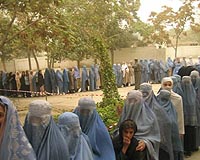| . |  |
. |
Taipei (AFP) Sept 25, 2009 Taiwan said Friday it will bar a visit by exiled Uighur leader Rebiya Kadeer while indirectly linking her organisation to terrorism, a move observers predicted will please China. "We have decided not to allow Kadeer entry considering that her visit could affect national interest and social order," Interior Minister Jiang Yi-huah said, according to an official with the Government Information Office. "The World Uighur Congress has close links to a terrorist organisation, this East Turkestan terrorist organisation... We don't wish to see the shadow of terrorism fall on Taiwan," he said in response to a lawmaker's question. It was unclear if Jiang was referring to the East Turkestan Islamic Movement, which is listed as a terrorist organisation by the United States. East Turkestan is a named used by some for Kadeer's home region of Xinjiang. The World Uighur Congress, which is headed by Kadeer, immediately opposed the linkage to terrorism. "We strongly oppose the minister's comment, made with no evidence at all," said Dilxat Raxit, a Sweden-based spokesman for the congress. "We demand that he retracts his statement at once." Kadeer said this week in Washington she planned to visit Taiwan in December following an invitation by groups advocating independence for the island. If Taiwan's government had granted Kadeer a visa, it would in all likelihood have infuriated Beijing, which says she is a "criminal" who orchestrated ethnic violence in Xinjiang in northwest China in July. Beijing is already angered by the screening this week in Taiwan's second-largest city Kaohsiung of a biopic about Kadeer, "The 10 Conditions of Love". The Kadeer film and a recent visit by exiled Tibetan leader the Dalai Lama to Taiwan have strained cross-strait ties, which have otherwise improved markedly since President Ma Ying-jeou came to power here in 2008. "Taiwan's decision is going to be a big relief for Beijing. Unlike the Dalai Lama's visit, Beijing would not swallow its anger this time," said George Tsai, a political scientist of Taipei's Chinese Culture University. The Dalai Lama's visit in late August and early September, at the invitation of the island's pro-independence opposition, placed the China-friendly government in a similar dilemma. It then solved the dilemma by letting him arrive on the island, but refusing to have any of its senior politicians meet him. The fact that the government changed its approach with Kadeer suggested fear of China's reaction, according to observers. "The government apparently made the decision under pressure from China, following the fallout from the Dalai Lama's visit," said Tung Chen-yuan, a political scientist at Taipei's National Chengchi University. Taiwan's ruling Kuomintang party immediately reacted to the decision, saying it was the right thing to do given the stakes. "The government's decision fits national and public interests and the Kuomintang fully supports the decision," the party said in a statement. Analysts had said Taiwan could risk jeopardising a major trade pact with China by allowing Kadeer to visit in December, since top negotiators of the two sides are likely to meet to discuss it during the month. "We regret the government refuses Kadeer's visit on national security reasons," said Sky Chao, spokesman of the opposition Democratic Progressive Party. "We demand an explanation why Taiwan has different standards than the rest of the world to associate Kadeer with terrorism." Guts United Taiwan, one of two pro-independence groups that invited Kadeer to visit, expressed its indignation in a statement. "The decision practically turns Taiwan into a province of China and downgrades the Taiwanese government to an administrative unit belonging to Beijing," it said. The group said its determination to invite Kadeer to visit Taiwan "will not change and we will not give up applying for a visa for her". Share This Article With Planet Earth
Related Links News From Across The Stans
 Outside View: The Afghan debacle
Outside View: The Afghan debacleWashington (UPI) Sep 23, 2009 Last week provided a treasure trove of raw meat for foreign policy enthusiasts, ideologues and talk radio hosts. The decision of the Obama administration to refocus missile defense in Europe away from the distant danger of a long-range Iranian ICBM threat to the proliferation of much shorter-range ballistic missiles that already can strike targets in the Middle East and Europe began a partisan ... read more |
|
| The content herein, unless otherwise known to be public domain, are Copyright 1995-2009 - SpaceDaily. AFP and UPI Wire Stories are copyright Agence France-Presse and United Press International. ESA Portal Reports are copyright European Space Agency. All NASA sourced material is public domain. Additional copyrights may apply in whole or part to other bona fide parties. Advertising does not imply endorsement,agreement or approval of any opinions, statements or information provided by SpaceDaily on any Web page published or hosted by SpaceDaily. Privacy Statement |